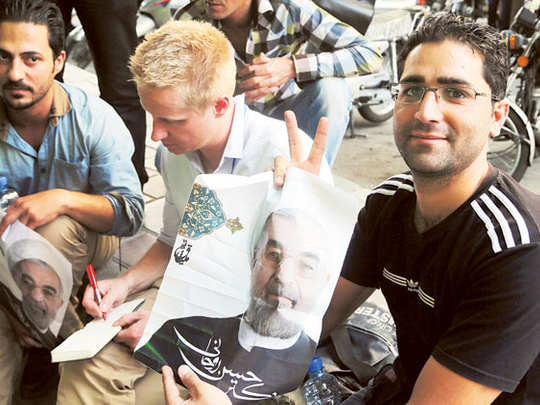
Tehran: The outcome of the Iran election is unlikely to transform relations between Iran and the outside world, the Islamic Republic’s disputed policy on developing nuclear power or its support of Syria’s president in the civil war there — all sensitive security matters that are the domain of Supreme Leader Ayatollah Ali Khamenei.
But the president does wield important influence in decision-making in the sprawling Shiite nation and major Opec state of 75 million and could bring a change from the confrontational style of President Mahmoud Ahmadinejad, who was constitutionally barred from seeking a third consecutive term.
Hassan Rouhani’s wide early margin revealed a major reservoir of pro-reform sentiment whereby many voters seized a chance to repudiate the dominant hardline elite over Iran’s economic woes, international isolation and crackdowns on personal freedoms despite restrictions on candidate choice and campaigning.
In an apparent attempt to convey political continuity to both domestic opponents and Western adversaries, Supreme Leader Ayatollah Ali Khamenei said that whatever the result of Friday’s election, it would be a vote of confidence in the 34-year-old Islamic Republic.
“A vote for any of these candidates is a vote for the Islamic Republic and a vote of confidence in the system,” the hardline clerical leader’s official Twitter account said.
British former Foreign Secretary Jack Straw, who dealt with Rouhani during nuclear negotiations between 2003 and 2005, called him a “very experienced diplomat and politician”.
“This is a remarkable and welcome result so far and I’m keeping my fingers crossed that there will be no jiggery-pokery with the final result,” Straw said, alluding to accusations of widespread rigging in the 2009 election.
“What this huge vote of confidence in Doctor Rouhani appears to show is a hunger by the Iranian people to break away from the arid and self-defeating approach of the past and for more constructive relations with the West,” he said.
“On a personal level I found him warm and engaging. He is a strong Iranian patriot and he was tough, but fair to deal with and always on top of his brief.”
Suzanne Maloney, senior fellow at the Brookings Institution, said Iran “appears to be on the verge of shocking the world”.
“With Rouhani leading the vote, the regime’s calculation now is whether a run-off campaign ... is worth the risk. A second round would entail an additional week of the kind of exhilarated campaigning, replete with young Iranians dancing in the streets and an amplified chorus of demands for social and political reforms, and ultimately pose a greater risk to the system.”
Excitement was rippling through Rouhani’s campaign headquarters with workers there preparing for victory, said a source close to the campaign. The Rohani campaign expected an announcement in the coming hours, the source said.
“Iran has held the most democratic elections in the world and there are no uncertainties about it,” Rafsanjani was quoted by Fars news agency as saying on Saturday.
Rouhani received another big lift when reformists led by ex-president Mohammad Khatami swung behind him after their own lacklustre candidate Mohammad Reza Aref withdrew in his favour.
In contrast, several high-profile conservatives with close ties to the ruling clerical or Revolutionary Guards elite failed to unite behind a single candidate, suffering what appeared to be a decisive split in their support base as a result.
Voting was extended by several hours at polling stations across the country on Friday as millions turned out to cast their ballot in the first presidential race since the 2009 contest where allegations of fraud led to mass unrest.












